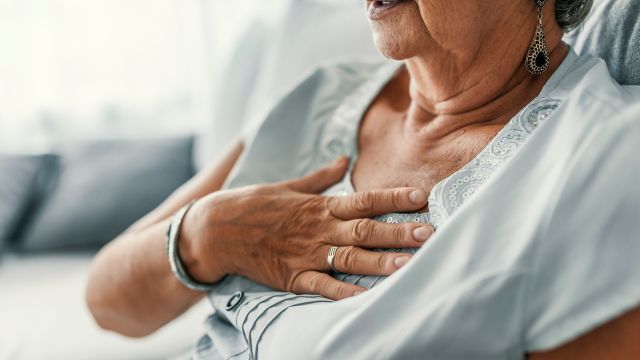Updated on January 9, 2024.
Heartburn occurs when digestive acid from the stomach backs up into the esophagus, the muscular tube that connects the throat and the stomach. This causes discomfort, often described as a burning sensation in the chest, because stomach acid damages and inflames the lining of the esophagus.
Heartburn can be caused by certain foods, drinks, and eating habits, including spicy, fatty, and fried foods. Large meals, alcohol, and lying down after eating are common causes, as well.
Triggers also include:
- Smoking and secondhand smoke
- Certain medications used to treat osteoporosis, high blood pressure, allergies, pain, sleep disorders, and depression
- Nonsteroidal anti-inflammatory drugs (NSAIDs), such as aspirin
- Increased pressure on the abdomen as a result of being overweight or obese, or wearing clothes and belts that are too tight
- Pregnancy
Recurring heartburn could also be a symptom of gastroesophageal reflux disease (GERD), a condition caused when the sphincter, or valve, at the bottom of the esophagus does not function as it should. The esophageal sphincter ordinarily opens and closes to allow food and liquid to enter your stomach. If the valve is weak or not working correctly, acid can flow back into the esophagus, causing heartburn symptoms. A type of hernia called a hiatal hernia, where part of the stomach bulges into the chest, can also cause heartburn and GERD.
Is GERD dangerous?
If left untreated, GERD can put a person at an increased risk for a number of long-term complications and serious health conditions, including:
Esophagitis: This inflammation of the esophagus can be painful and may make swallowing difficult. It could lead to bleeding and ulcers in the esophagus, as well. Over time, this inflammation can cause structural changes to the esophagus.
Strictures: If the lining of the esophagus gets scarred, it may cause a narrowing of the esophagus, called strictures. This narrowing makes it difficult to swallow, and it may feel like food is getting stuck. Strictures can be treated with a procedure that will help stretch the throat to provide relief.
Ulcers: Just like in the stomach, acid can erode tissue lining in the esophagus and cause a type of sore called an ulcer. The ulcer may bleed and make it difficult to swallow.
Barrett's esophagus: Long-term GERD can damage the lining of the esophagus, causing a condition called Barrett's esophagus. When the cells that usually line the esophagus are replaced with those that resemble cells in the small intestine, they become more resistant to stomach acid. These cells can become abnormal and result in dysplasia, a pre-cancerous condition.
Though most people with Barrett's esophagus do not develop cancer, they are at a higher risk of developing a type of cancer called adenocarcinoma. Thankfully, the absolute risk—even in patients with Barrett's esophagus—is still very low. Your healthcare provider (HCP) will most likely recommend regular exams to check for cancer.
Esophageal cancer: People with GERD have a higher risk of cancer of the esophagus, as well as cancer of the gastroesophageal junction, the area where the esophagus joins the stomach. Both cancers are considered rare, and the lifetime risk—1 in 125 men, and 1 in 417 women—for esophageal cancer is low. But treating heartburn and GERD will help prevent damage and progression.
Treatment for GERD
In many cases, acid reflux and heartburn are treatable, and have a good prognosis. If you experience it at least twice weekly, you should discuss your symptoms with your HCP to determine if GERD is causing them and, if so, your best course of treatment.
There are a number of lifestyle changes that can help reduce GERD symptoms, including:
- Quitting smoking
- Avoiding trigger foods such as peppermint, caffeine, alcohol, and fatty foods
- Avoiding foods that could aggravate an injured esophagus, such as orange or tomato juice
- Eating smaller amounts at mealtime
- Wearing loose-fitting clothes
- Not lying down for at least two hours after eating
- Elevating the head of your bed when you sleep, using a wedge placed under your mattress rather than a pillow
- Losing weight if you are overweight or obese
- Talking to your HCP about medications you are taking to determine if they could be causing heartburn
GERD can also be treated with a number of medications, including antacids, H-2-receptor blockers, and proton pump inhibitors. Some patients may be directed to use over-the-counter medication, while others may need prescription-strength medication. In rare cases, surgery may be recommended.







